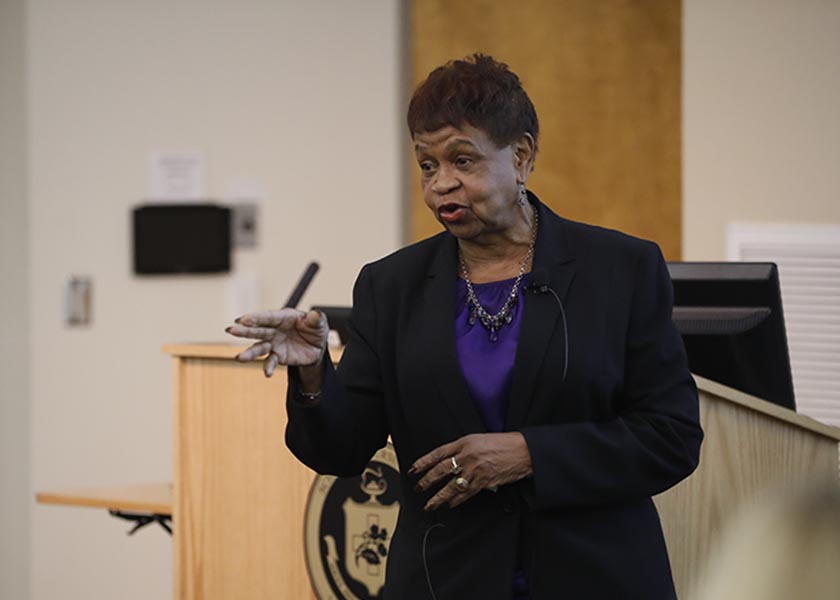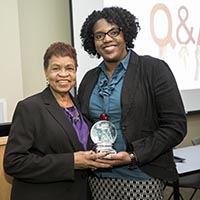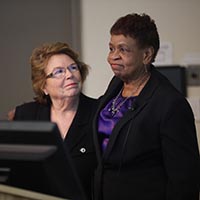
One needn’t be a student to profit from Alicia Georges’ directions on becoming a leader. The soon-to-be volunteer head of AARP outlined a course to leadership that could be used by people in all career stages during her recent Dean’s Diversity Lecture, “Journey to Leadership in Nursing and Beyond: Insight for Future Nurse Leaders,” at Vanderbilt University School of Nursing.
Before an audience of doctoral students, faculty and guests, Georges, EdD, FAAN, described her path from community nurse to university department chair and president-elect of the 38-million-member AARP, and offered insights and concrete action items that could advance her listeners’ careers.
Among her action items were to map out a clear path, do your homework and have both drive and vision. She also discussed traits that make good leaders: interact with people and believe in them, be comfortable with sharing power, have integrity, be comfortable with change, share the rewards, empower others and take risks.
“Every action taken involves a risk. I know people don’t like risks, but if you want to make a difference — if you want change — you have to be someone who takes a risk,” she said. “If you understand what you’re doing and it’s for an organization you believe in, it’s a risk worth taking.”
Georges, who is professor and chair of the Department of Nursing at the School of Health Sciences, Human Services and Nursing at New York’s Lehman College, also talked about characteristics necessary for nurse leaders.
 “If you are not interested in human care, forget trying to be any future nurse leader. You’ll be destroyed by the people you’re trying to lead,” she said. “If you don’t believe that people are worthwhile, then forget about being a leader.”
“If you are not interested in human care, forget trying to be any future nurse leader. You’ll be destroyed by the people you’re trying to lead,” she said. “If you don’t believe that people are worthwhile, then forget about being a leader.”
She encouraged her listeners to engage and connect with others outside the profession. “You know nurses tend to talk to nurses, but I talk to anybody. We’re not giving care to each other – we’re giving care to populations, to groups of people that we need to engage with.”
Georges also emphasized commitment to community and service. “The other thing is you have to be concerned with the common good. You have to be service-oriented,” she said. “I believe in research and I’ll push my faculty and be vocal to make sure they get a research agenda. But you also have to be service-oriented if you’re a leader. We care about patient outcomes and creating healthy communities — that’s why we’re doing it.”
Community and service have been Georges’ hallmark throughout her more than 40-year-career. Before turning to academia, she was a staff nurse, team leader, supervisor and district manager for the Visiting Nurse Service of New York. She has been active in community service in the Bronx since doing field work there during her master’s program at NYU in the 1970s.
 In the course of her career, Georges was named to the U.S. Department of Health and Human Service Advisory Council on Nursing Education and Practice and to the New York State Governor’s Health Care Advisory Board. She served terms as president of the National Black Nurses Association, the National Black Nurses Foundation and the Commission on Graduates of Foreign Nursing Schools. She spent nearly 20 years on community boards in New York. Currently, she serves on the advisory board of the Black Women’s Health Study and R.A.I.N. (Regional Aid for Interim Needs). She is a fellow of the American Academy of Nursing and the New York Academy of Medicine.
In the course of her career, Georges was named to the U.S. Department of Health and Human Service Advisory Council on Nursing Education and Practice and to the New York State Governor’s Health Care Advisory Board. She served terms as president of the National Black Nurses Association, the National Black Nurses Foundation and the Commission on Graduates of Foreign Nursing Schools. She spent nearly 20 years on community boards in New York. Currently, she serves on the advisory board of the Black Women’s Health Study and R.A.I.N. (Regional Aid for Interim Needs). She is a fellow of the American Academy of Nursing and the New York Academy of Medicine.
In addition to her academic roles, she is president-elect of AARP, representing the largest organization of Americans over 50. She was elected to the AARP board in 2010 and currently chairs its National Policy Council. She will start her term as president in June.
“I’ve known Alicia for decades and respect her for her scholarship, leadership and policy work,” said VUSN Dean Linda D. Norman, DSN, FAAN. “She’s one of the most dynamic and influential leaders in nursing today—but she has never lost her dedication to building up the next generation of nurse leaders. I’m grateful she was able to join us. I think our students gained specific insight and direction that will help them as they move forward in their careers.”
The next VUSN Dean’s Diversity Lecture will be Monday, May 7. Asa Radix, MD, FACP, will speak on “Transgender Medicine – 2018 Update.” Radix, a national expert regarding the health care needs of transgender people, is director of Research and Education and the clinical director of Transgender Health at Callen-Lorde Community Health Center in New York City.
The Vanderbilt University School of Nursing Dean’s Diversity Lecture Series was established in 2016. It explores the diversity of backgrounds, cultures, ideas and viewpoints in our world today. It seeks to equip students, faculty, staff and other community members with the knowledge and understanding needed to lead nursing forward in a global society.
Photos: John Russell/Vanderbilt University
From top:
Alicia Georges delivers the first 2018 VUSN Dean’s Diversity Lecture on Monday, Jan. 8.
Shawanda Clay (right), MSN’99, president of the Nashville chapter of the National Black Nurses Association, presented Alicia Georges with a gift from the association. Georges is a past national president of NBNA.
VUSN Dean Linda Norman (left) with Alicia Georges during applause after Georges’ presentation.